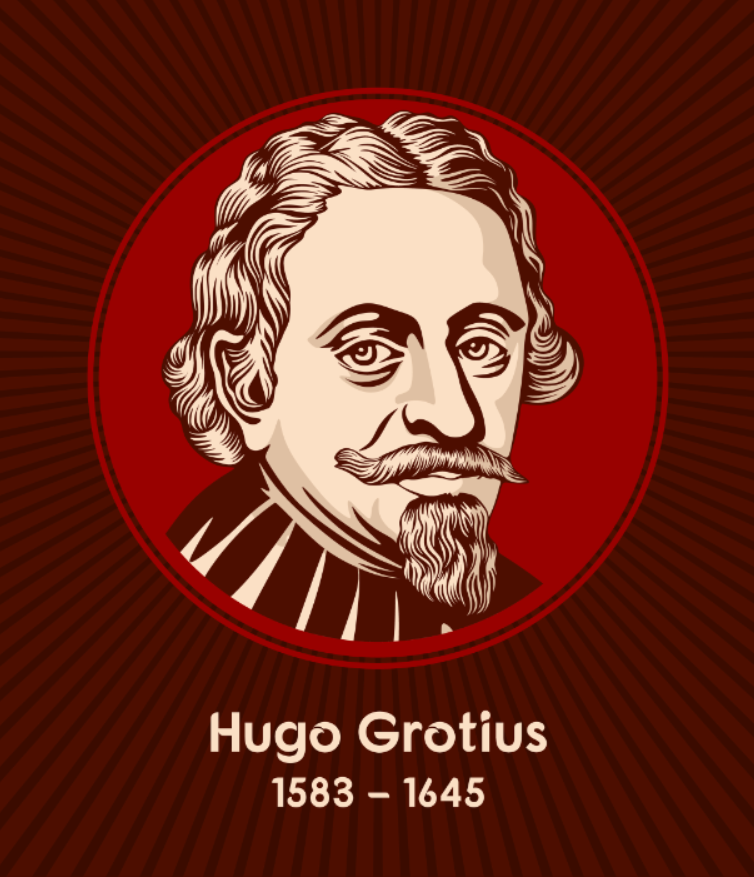- UNITS
- Unit 5 - Hugo Grotius
- The Game of Words
- Prof. Quinn and Paul's Conversation
- Eloquence
- Latin Phrases
- Language Knots
- Test Corner
- LEARNING

♦ This introductory exercise aims to give you a feel for the sound and rhythm of the language, whilst presenting an overview of the maritime topic at hand. ♦ By reading and then listening to the accompanying audio, you’ll discover how words are pronounced and some simple sentence structures. ♦ Once you are comfortable with how the written and spoken words are connected, you’ll be ready to focus on keywords in the next exercise.
Hugo Grotius
In 1583, Hugo Grotius was born into a world that was changing fast and furiously. Old imperial regimes in Spain and China were declining, and new national powers in the Netherlands and Britain were fast replacing them.
The world was rife with war, political plots, and piracy and buccaneering. The Christian religion was splitting into Catholic and Protestant groupings, also leading to widespread religious violence.
Today we call the place where Grotius was born the Netherlands. In his time this territory was part of the Spanish Empire, though it was governed by a political assembly called the States-General. You could say at this time the Golden Age of Exploration was just ending, whilst the Age of Global Empires was just beginning.
Having discovered new global regions in the previous century, the European competition for the new resources and trade in these regions was becoming fierce. In 1602, the States-General set up the Dutch East India Company (or “VOC”) to enter the highly profitable spice trade and take market share from Portuguese merchants. Since the Portuguese and Spanish empires were united under the same king, Philip II, challenging Portuguese trade was also an act towards independence for the Dutch States-General.
Grotius was born in Delft, to a political and academic family, and he began studying at the University of Leyden at age 11, impressive but not uncommon for the time. Aged 15, he went on a diplomatic mission to Henry IV of France. Hugo’s age and intelligence were noted by the king, who reportedly said: “Behold the miracle of Holland!” Beyond his early diplomacy, Grotius started to write essays and publications across mathematics, philosophy, history, theology and law. From his personal letters, it is believed that law was actually his least favourite subject. But because of the tensions and conflicts of his times, it was also the area where his skills were in highest demand.
Between 1604-08, Grotius wrote his first major legal work, On the Law of Prize (De Jure Praedae). It was written for his client, the VOC, and it contested the Portuguese monopoly of sea trade in Asia established by the 1493 Treaty of Tordesillas. The case details are that a Dutch fleet of trading ships set out to the East Indies in 1598, and their trading efforts were blocked by the Portuguese and Spanish. In this context, the most profitable strategy was to “take prize” of enemy vessels and capture their cargo. In 1603, a VOC admiral captured a Portuguese ship rich with treasure. The prize of this single vessel was more than half of the VOC’s total investment capital. Prize-taking like this was a grey and controversial area in Dutch law, and Grotius was tasked to find a legal solution that fit the emerging power of the VOC.
Grotius’s central argument was that the right to trade and navigate on the open seas was universal, a law of nature. Every country must have access to the new ‘global marketplace’, and no treaty or deal could change this law of nations (jus gentium). He then detailed a history of Dutch-Portuguese relations and navigation. The thesis ends with a conclusion referencing Greek and Roman law and philosophers to prove that prize-taking was morally and legally justifiable. The work is not seen as impartial, it’s an advocate’s essay more than a judge’s.
After he published this in the book Mare Liberum (Freedom of the Seas), Grotius was drawn into religious disputes in the Netherlands. He was imprisoned, but ingeniously escaped in his own suitcase. He fled to Paris, and then later to Hamburg, where he wrote other major works such as On the Law of War and Peace (De Jure Belli ac Pacis) and acted as the Swedish ambassador to France. He fell ill on a couple of difficult sea journeys, and in the end died in Germany in 1645.
